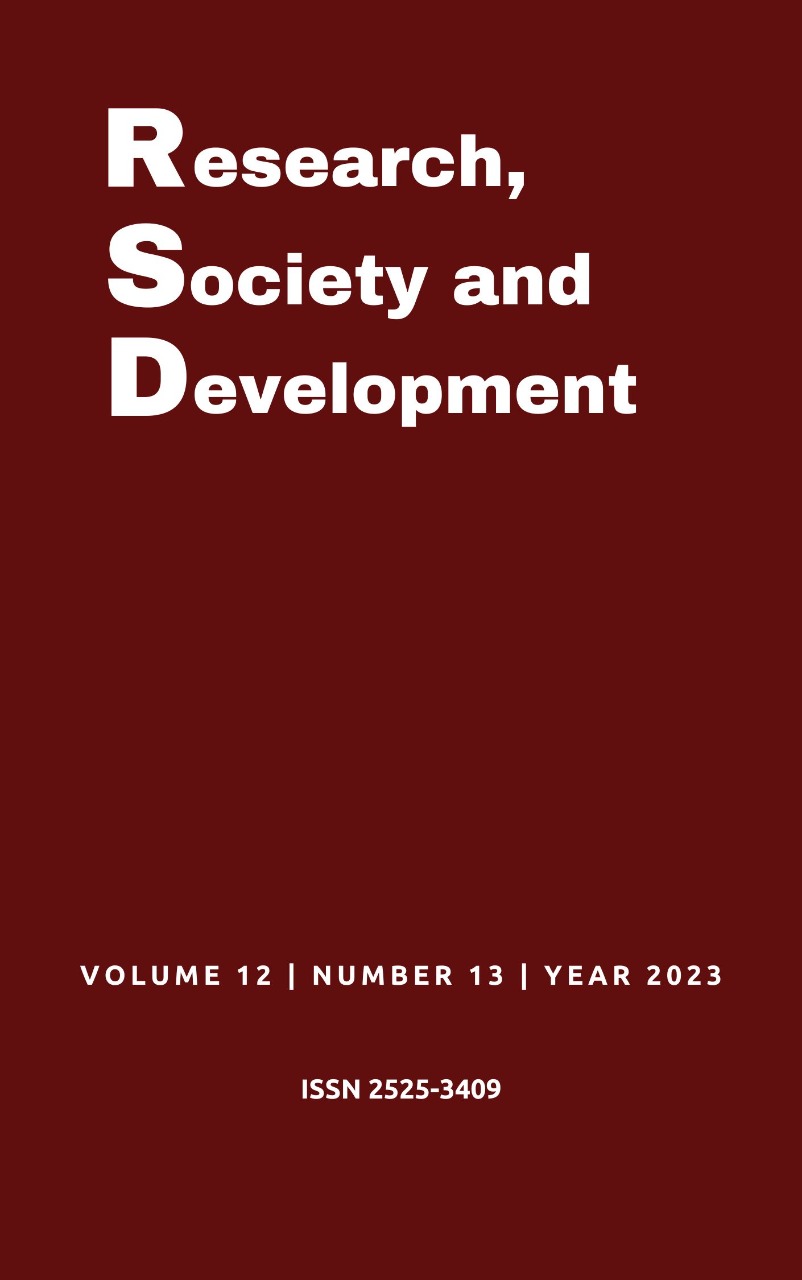Nursing students' perception regarding borderline personality disorder
DOI:
https://doi.org/10.33448/rsd-v12i13.44255Keywords:
Nursing students, Personality disorder borderline, Mental health.Abstract
The objective of the work was to assess the knowledge of nursing students regarding borderline Personality Disorder. This study was conducted through an online survey provided by the "Google Forms" platform to students from a private University Center in Curitiba. Twenty-seven nursing students from the 7th semester and above participated during the month of October 2023. As a result, it was observed that the majority of interviewed students reported being familiar with borderline Personality Disorder and claimed to have had or currently have subjects related to mental health. Regarding the causes, consequences, and manifestations of the disorder, most were unable to respond specifically and could not probe or detail their answers more precisely. We can conclude that borderline Personality Disorder is present, but students' knowledge about it is not yet adequately satisfactory. Therefore, there is a need to deepen the topic in classrooms, academic internships, expanding scientific knowledge, and promoting the improvement and training of professionals in the field. This way, students can become capable of welcoming and dealing with the social, pathological, environmental, and contextual conditions in which their patients are immersed.
References
Agnol, E. C. D., Meazza, S. G., Guimarães, A. N., Vendruscolo, C., & Testoni, A. K. (2019). Cuidado de enfermagem às pessoas com transtorno de personalidade borderline na perspectiva freireana. Revista Gaúcha de Enfermagem, 40, e20180084. https://doi.org/10.1590/1983-1447.2019.20180084
Amarante, P. & Nunes, M. O. de. (2018). A reforma psiquiátrica no SUS e a luta por uma sociedade sem manicômios. Ciência & Saúde Coletiva, 23(6): 2067-2074. https://doi.org/10.1590/1413-81232018236.07082018
American Psychiatric Association (APA). (2014). Manual diagnóstico e estatístico de transtornos mentais- DSM-5. (5a ed.), Artmed.
Barbosa, S. C., Araújo, A. H. I. M. de., & Mendes, M. I. O. I. de. (2020). Assistência de enfermagem ao paciente com transtorno de personalidade borderline: uma revisão da literatura. Revista JRG de Estudos Acadêmicos, 3(7), 647-656. http://doi.org/10.5281/zenodo.4282957
Cassiano, A. P. C., Silva, R. G. da., Almeida, C. L. de., & Silva, D. A. da. (2016). Percepção dos enfermeiros frente ao atendimento de portadores de borderline. Nursing, ed. bras. Impresso, 19(220), 1381-1385.
Conselho federal de enfermagem. (2022). Diretrizes Nacionais de Atenção à Enfermagem em Saúde Mental. Brasília. https://biblioteca.cofen.gov.br/diretrizes-nacionais-enfermagem-saude-mental/
Dalgalarrondo, P., & Vilela, W. A. (1999). Transtorno borderline: histório e atualidade. Revista Latinoamericana de Psicopatologia Fundamental, 2(2), 52-71. https://doi.org/10.1590/1415-47141999002004
Danton, G. (2002). Metodologia cientifica. Virtual Books
Esperidão, E., Silva, N. S. dos., Caixeta, C. C., & Rodrigues, J. (2013). A Enfermagem psiquiátrica, a ABEn e o departamento científico de enfermagem psiquiátrica e saúde mental: avanços e desafios. Revista Brasileira de Enfermagem, 2013; 66(esp), 171- 6. https://doi.org/10.1590/S0034-71672013000700022
Estevam, A. S. dos., Feitosa, D. V. S. dos., Silva, N. S. O. de., Melo, S. N. de., Aragão, A. P. S., & Almeida, T. F. (2020). A enfermagem em saúde mental pós reforma psiquiátrica. Revista Eletrônica Acervo Saúde, (45), e2631. https://doi.org/10.25248/reas.e2631.2020
Finkler, D. C., Schäfer, J. L., & Wesner, A. C. (2017). Transtorno de personalidade borderline: estudos brasileiros e considerações sobre a DBT. Revista Brasileira de Terapia Comportamental e Cognitiva, 19(3), 274 – 292. https://doi.org/10.31505/rbtcc.v19i3.1068.
Maia, M., Moreira, A. das G. G., Kasimoff, A. C. S., Gomes, M. N., & Bucco, M. (2023). Análise da perspectiva dos estudantes de enfermagem em relação ao cuidado ao paciente com suspeita de sepse. Research, Society and Development, 12(8), e13512842992. https://doi.org/10.33448/rsd-v12i8.42992
Melo, H. P., Baldoino, F. R. R., Melo, H. P., Alves, K. R. de B., Baldoino, L. K. R., & Cunha, T. B. L. (2021). Caracterização do transtorno de personalidade Borderline: Uma revisão de literatura. Research, Society and Development, 10(3), e52510312619. https://doi.org/10.33448/rsd-v10i3.12619
Minayo, M. C. S. de., & Guerriero, I. C. Z. (2014). Reflexividade como éthos da pesquisa qualitativa. Ciência e saúde coletiva, 19(4), 1103-1112. https://doi.org/10.1590/1413-81232014194.18912013
Ministério da Saúde. (2020). O que significa ter saúde. https://www.gov.br/saude/pt-br/assuntos/saude-brasil/eu-quero-me-exercitar/noticias/2021/o-que-significa-ter-saude
Ministério da saúde. (2021). 20 anos da Reforma Psiquiátrica no Brasil: 18/5 – Dia Nacional da Luta Antimanicomial. https://bvsms.saude.gov.br/20-anos-da-reforma-psiquiatrica-no-brasil-18-5-dia-nacional-da-luta-antimanicomial/
Organização Pan-Americana da Saúde. (2022). OMS destaca necessidade urgente de transformar saúde mental e atenção. https://www.paho.org/pt/noticias/17-6-2022-oms-destaca-necessidade-urgente-transformar-saude-mental-e-atencao
Santos, F. M. dos. (2012). Análise de conteúdo: a visão de Laurence Bardin. Revista Eletrônica de Educação, 6(1), 383-387. http://www.reveduc.ufscar.br.
Souza, S. S. C. de., & Corrêa, A. S. (2019). Da terapia cognitiva comportamental à terapia de esquemas para o transtorno da personalidade borderline. Disciplinarum Scientia. Série: Ciências da Saúde, 20(2), 439-446. https://doi.org/10.37777/2828
Warol, P. H. A., Cerqueira, J. P. F., Fonseca, T. S. P. de., Gomes, D. S., Sousa, M. R. de., & Siqueira, E. C. de. (2022). Uma análise acerca das características do transtorno de personalidade borderline: revisão de literatura. Revista Eletrônica Acervo Saúde, 15(3), e9871. https://doi.org/10.25248/reas.e9871.2022
Downloads
Published
Issue
Section
License
Copyright (c) 2023 Lucas Luvizutti Lima; Náthally Silva Neponuceno; Ingrid Solange Evans Osses

This work is licensed under a Creative Commons Attribution 4.0 International License.
Authors who publish with this journal agree to the following terms:
1) Authors retain copyright and grant the journal right of first publication with the work simultaneously licensed under a Creative Commons Attribution License that allows others to share the work with an acknowledgement of the work's authorship and initial publication in this journal.
2) Authors are able to enter into separate, additional contractual arrangements for the non-exclusive distribution of the journal's published version of the work (e.g., post it to an institutional repository or publish it in a book), with an acknowledgement of its initial publication in this journal.
3) Authors are permitted and encouraged to post their work online (e.g., in institutional repositories or on their website) prior to and during the submission process, as it can lead to productive exchanges, as well as earlier and greater citation of published work.


